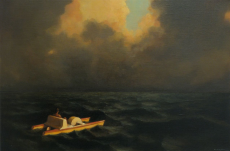
Email: reecejordan98@hotmail.co.uk
Total Article : 168
About Me:18-year-old sixth form student, studying English Literature, History and Government and Politics. My articles will broadly cover topics from the current affairs of politics to reviews of books and albums, as well as adding my own creative pieces, whether it be short fiction or general opinion.

It is a truth universally acknowledged that sometime in around year nine or year ten, the subject of the lesson will be a Shakespearean play, and that there will subsequently be a mass sigh of ‘why are we even doing this?’ The teacher, who themselves seem a little thrown back by the question despite its frequency, replies ‘well, because you have to, it’s on the syllabus – and besides, he’s the greatest writer of the English language.’ Thus ensues a further sigh, followed by a complete fixation on the birds outside the window.
Indeed, what point is there to Shakespeare if it is just something that happens to be on the syllabus? We get it, he’s supposed to be the best writer ever, but what’s the point – thus, thou, thee, bite my thumb sir? He’s biting his thumb? Forget it.
This classroom apathy, in which English is taught as some sort of peculiar necessity for some historical aspect, is what has bred the attitude that we have today towards art as a whole. It is what leads people to think that the study of arts-based subjects is for people who not only have no function in the modern world, but who do not have the intellect to study the more STEM subjects. Georg Hegel, in his Introductory Lectures on Aesthetics, whilst being appreciative of art, shares a similar kind of sentiment:
Beauty and art no doubt pervade the business of life like a kindly genius, and form the bright adornment of all our surroundings, both mental and material, soothing the sadness of our condition and the embarrassment of real life, killing time in an entertaining fashion, and where there is nothing good to be achieved, occupying the place of what is vicious, better at any rate than vice. [...] even if the creations of art do not prove detrimental to our graver purposes, if they appear at times actually to further them by keeping evil at a distance, still it is so far true that art belongs rather to the relaxation and leisure of the mind, while the substantive interests of life demands its exertion.
Whilst Hegel has written this in 1820, you would be forgiven for believing that it was penned by some sort of maths, science or economics professor at any Russell Group university. What he focuses on is that the arts are supplementary, albeit necessary, in the world to our real issues at hand. He paints it as something almost anaesthetising, that art is ‘soothing the sadness of our condition and the embarrassment of real life’. He even sees it as something antithetical to productivity, somehow ‘killing time in an entertaining fashion’. Now, I’m not writing this article to suggest that what Hegel has written is completely false.
Image Credits: 1stDibs

0 Comment:
Be the first one to comment on this article.